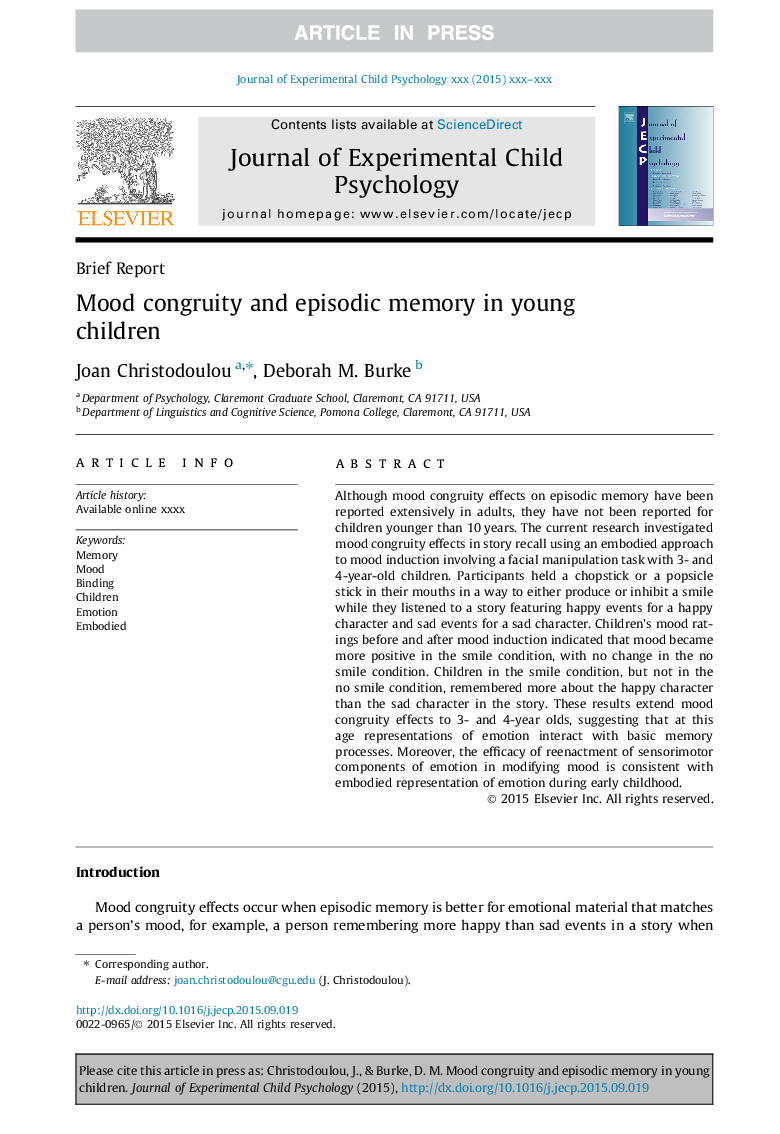| کد مقاله | کد نشریه | سال انتشار | مقاله انگلیسی | نسخه تمام متن |
|---|---|---|---|---|
| 7274872 | 1473470 | 2016 | 9 صفحه PDF | دانلود رایگان |
عنوان انگلیسی مقاله ISI
Mood congruity and episodic memory in young children
ترجمه فارسی عنوان
انطباق حالت و حافظه اپیزودیک در کودکان جوان
دانلود مقاله + سفارش ترجمه
دانلود مقاله ISI انگلیسی
رایگان برای ایرانیان
کلمات کلیدی
حافظه، حالت، الزام آور، فرزندان، هیجانی، تجسم،
ترجمه چکیده
اگر چه اثرات سازگاری خلقی بر حافظه اپیزودیک به طور گسترده ای در بزرگسالان گزارش شده است، اما برای کودکان زیر 10 ساله گزارش نشده است. پژوهش حاضر، اثرات سازگاری خلق را در یادآوری داستان با استفاده از یک رویکرد مبهم به القاء خلق که شامل وظیفه دستکاری صورت با کودکان 3 تا 4 ساله است، مورد بررسی قرار داد. شرکت کنندگان یک چوپان یا چوب چاقو در دهان خود گذاشتند تا بتوانند یک لبخند را تولید کنند یا مهار کنند، در حالی که آنها به یک داستان حوادث شاد برای یک شخصیت شاد و وقایع غم انگیز برای شخصیت غمگین گوش دادند. رتبه های خلق و خوی کودکان قبل و بعد از تحریک خلق و خوی نشان می دهد که خلق و خوی در وضعیت لبخند مثبت تر است، بدون تغییر در وضعیت لبخند. کودکان در شرایط لبخند، اما نه در حالت لبخند، بیشتر در مورد شخصیت شادتر از شخصیت غمگین در داستان به یاد می آورید. این نتایج جلوه های سازگاری خالص را به 3 تا 4 ساله می رساند و بیان می کند که در این سن، بیان احساسات با فرایندهای حافظه پایه ارتباط دارد. علاوه بر این، اثربخشی مجدد حساسیت مولفه های احساسات در خلق و خوی اصلاح شده سازگار با تجسم بازنمایی احساسات در دوران کودکی است.
موضوعات مرتبط
علوم انسانی و اجتماعی
روانشناسی
روانشناسی رشد و آموزشی
چکیده انگلیسی
Although mood congruity effects on episodic memory have been reported extensively in adults, they have not been reported for children younger than 10Â years. The current research investigated mood congruity effects in story recall using an embodied approach to mood induction involving a facial manipulation task with 3- and 4-year-old children. Participants held a chopstick or a popsicle stick in their mouths in a way to either produce or inhibit a smile while they listened to a story featuring happy events for a happy character and sad events for a sad character. Children's mood ratings before and after mood induction indicated that mood became more positive in the smile condition, with no change in the no smile condition. Children in the smile condition, but not in the no smile condition, remembered more about the happy character than the sad character in the story. These results extend mood congruity effects to 3- and 4-year olds, suggesting that at this age representations of emotion interact with basic memory processes. Moreover, the efficacy of reenactment of sensorimotor components of emotion in modifying mood is consistent with embodied representation of emotion during early childhood.
ناشر
Database: Elsevier - ScienceDirect (ساینس دایرکت)
Journal: Journal of Experimental Child Psychology - Volume 142, February 2016, Pages 221-229
Journal: Journal of Experimental Child Psychology - Volume 142, February 2016, Pages 221-229
نویسندگان
Joan Christodoulou, Deborah M. Burke,
